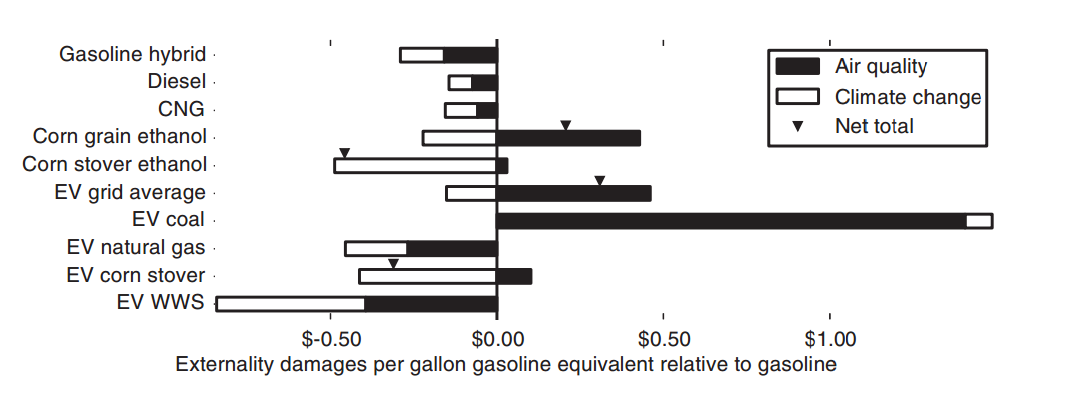Sorry Zathras, I must have missed this post, I just saw it when looking for Powerwall info, so let me address now:
...
As for environmental issues, while I appreciate ERD's viewpoint, I prefer the analysis done by the Union of Concerned Scientists and others that spell out their methodology and have full references. ...
No doubt you prefer their analysis, it tells you what you want to hear!
And I do try to provide references and spell out my methodology, there really would be no point in making unsubstantiated claims to some of the EV fans here. So if anything I said sounds fishy to you, go ahead and refute it, and we can have a discussion on it.
I addressed this " Union of Concerned Scientists" paper earlier ("
State of Charge") in post #201, so I won't rehash it all again, but to summarize, it isn't 'scientific'. A scientific approach would be to analyze each option and present the results. But that whole paper reads more like a PR release for EVs. Everything is stated in terms that make the EV look as good as they can, moving the goal-posts to match EV highlights, rather than a straightforward analysis of each option under each condition. I know BS when I smell it.
Worse than that, they 'hand-wave' other considerations outside of GHG. Particulates, SOx, NOx, etc:
In addition, EVs produce a tiny, tiny fraction of the local pollution tied to asthma and other respiratory ailments in urban and near highway environments.
Hmmm, no reference, no numbers, no explanation of methodology? How about the reference that
I provided, that shows that the health effects of that pollution, regardless of how 'local' it is or isn't, is actually very, very significant? See my posts #447 and #442.
But besides all that, people buying Teslas (as already mentioned and acknowledged) are not buying Prii. They would more typically be buying luxury, sports, truck or SUVs.
Pretty irrelevant. As I said earlier, if EVs are actually going to make a significant impact, they have to make up some significant % of miles driven. So it won't be just sport car buyers, but everyday people. And many of those people don't have garages with 220V power. But I've covered that.
And, even on a grid that is 100% coal, the average EV is equivalent in GHGs as a 30mpg gas car. Better than the fleet average for light vehicles. Which is what these EVs are replacing.
OK, now to a really controversial point that I know you won't like. It was actually an edited after-though to my post #457:
* (edit/add): So does this means the EVs are in effect drawing completely from the dirty part of the grid? It would seem so. Oh No!
I kept thinking, that can't be right! But I keep thinking it over an over this past month, and I can't shake it. So again:
Regardless whether overall demand is shrinking, level, or growing, adding demand from EVs 'waters down' the greening of the grid. Simple numbers to illustrate: Let's say demand dropped 10% and the grid reached 50% renewables. Add back 10% in EV demand, and now those renewables only make up ~ 45% of the grid*. To get back to 50%, you need to add more renewables to compensate for the added EV demand. And to belabor the point, if you added those renewables, but not the EVs, you'd be at ~ 55% renewables on that grid, rather than 50%.
So EVS aren't really taking advantage of a greener grid AT ALL! They are using the non-renewable allocation! To think of it another way, let's say an area grid is 20% renewables, and they plan to get to 30% in the next ten years. Well, why aren't they at 30% now? Obviously, because they have exhausted all the renewables they can, there is no more, 20% is it. The utility would love to draw more power form solar/wind, as they 'fuel' is free. But that's all there is. So when a large group plug in their EVs, there simply is no more renewables available. So they have to get the additional power from non-renewables. Which probably means cranking the coal plants up a bit, as NG is expensive. Same story when they reach 30%...
So are the EVS really burning nearly 100% coal? It seems so. I'll allow that it would not be 100%, wind is stronger at night, and demand is lower, but it is still variable, so the utility is cautious about dropping the coal plants too low, as it takes expensive NG peakers to make up the delta. Bottom line, I really do not think it is scientific to use grid averages to the added demand from EVs. It's similar to marginal versus average tax rate calculations. Gotta use the right number.
OK, refute that!

-ERD50

